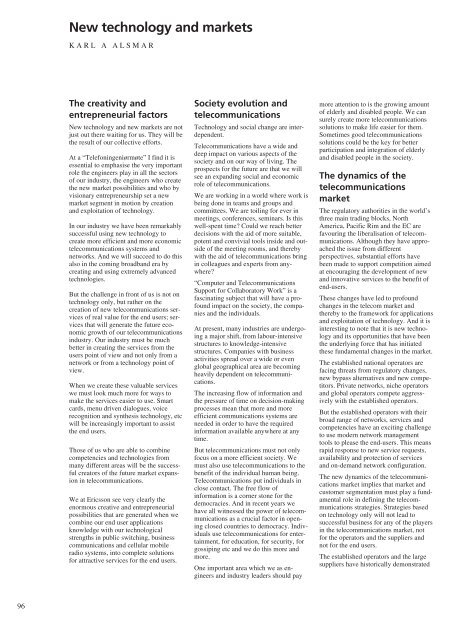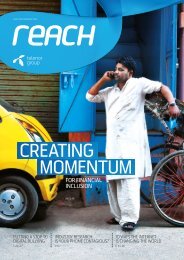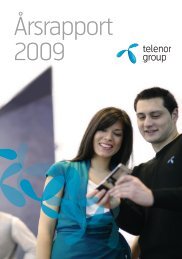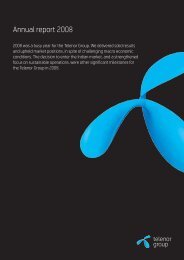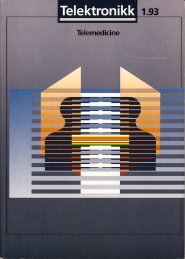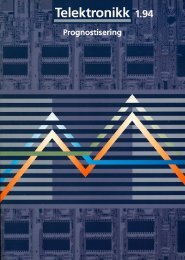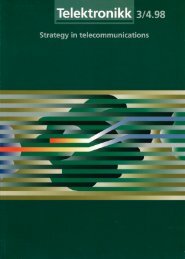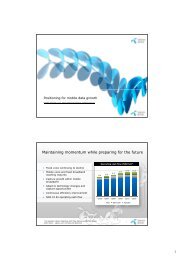Norsk Telefoningeniørmøte 1992 - Telenor
Norsk Telefoningeniørmøte 1992 - Telenor
Norsk Telefoningeniørmøte 1992 - Telenor
You also want an ePaper? Increase the reach of your titles
YUMPU automatically turns print PDFs into web optimized ePapers that Google loves.
96<br />
New technology and markets<br />
KARL A ALSMAR<br />
The creativity and<br />
entrepreneurial factors<br />
New technology and new markets are not<br />
just out there waiting for us. They will be<br />
the result of our collective efforts.<br />
At a “<strong>Telefoningeniørmøte</strong>” I find it is<br />
essential to emphasise the very important<br />
role the engineers play in all the sectors<br />
of our industry, the engineers who create<br />
the new market possibilities and who by<br />
visionary entrepreneurship set a new<br />
market segment in motion by creation<br />
and exploitation of technology.<br />
In our industry we have been remarkably<br />
successful using new technology to<br />
create more efficient and more economic<br />
telecommunications systems and<br />
networks. And we will succeed to do this<br />
also in the coming broadband era by<br />
creating and using extremely advanced<br />
technologies.<br />
But the challenge in front of us is not on<br />
technology only, but rather on the<br />
creation of new telecommunications services<br />
of real value for the end users; services<br />
that will generate the future economic<br />
growth of our telecommunications<br />
industry. Our industry must be much<br />
better in creating the services from the<br />
users point of view and not only from a<br />
network or from a technology point of<br />
view.<br />
When we create these valuable services<br />
we must look much more for ways to<br />
make the services easier to use. Smart<br />
cards, menu driven dialogues, voice<br />
recognition and synthesis technology, etc<br />
will be increasingly important to assist<br />
the end users.<br />
Those of us who are able to combine<br />
competencies and technologies from<br />
many different areas will be the successful<br />
creators of the future market expansion<br />
in telecommunications.<br />
We at Ericsson see very clearly the<br />
enormous creative and entrepreneurial<br />
possibilities that are generated when we<br />
combine our end user applications<br />
knowledge with our technological<br />
strengths in public switching, business<br />
communications and cellular mobile<br />
radio systems, into complete solutions<br />
for attractive services for the end users.<br />
Society evolution and<br />
telecommunications<br />
Technology and social change are interdependent.<br />
Telecommunications have a wide and<br />
deep impact on various aspects of the<br />
society and on our way of living. The<br />
prospects for the future are that we will<br />
see an expanding social and economic<br />
role of telecommunications.<br />
We are working in a world where work is<br />
being done in teams and groups and<br />
committees. We are toiling for ever in<br />
meetings, conferences, seminars. Is this<br />
well-spent time? Could we reach better<br />
decisions with the aid of more suitable,<br />
potent and convivial tools inside and outside<br />
of the meeting rooms, and thereby<br />
with the aid of telecommunications bring<br />
in colleagues and experts from anywhere?<br />
“Computer and Telecommunications<br />
Support for Collaboratory Work” is a<br />
fascinating subject that will have a profound<br />
impact on the society, the companies<br />
and the individuals.<br />
At present, many industries are undergoing<br />
a major shift, from labour-intensive<br />
structures to knowledge-intensive<br />
structures. Companies with business<br />
activities spread over a wide or even<br />
global geographical area are becoming<br />
heavily dependent on telecommunications.<br />
The increasing flow of information and<br />
the pressure of time on decision-making<br />
processes mean that more and more<br />
efficient communications systems are<br />
needed in order to have the required<br />
information available anywhere at any<br />
time.<br />
But telecommunications must not only<br />
focus on a more efficient society. We<br />
must also use telecommunications to the<br />
benefit of the individual human being.<br />
Telecommunications put individuals in<br />
close contact. The free flow of<br />
information is a corner stone for the<br />
democracies. And in recent years we<br />
have all witnessed the power of telecommunications<br />
as a crucial factor in opening<br />
closed countries to democracy. Individuals<br />
use telecommunications for entertainment,<br />
for education, for security, for<br />
gossiping etc and we do this more and<br />
more.<br />
One important area which we as engineers<br />
and industry leaders should pay<br />
more attention to is the growing amount<br />
of elderly and disabled people. We can<br />
surely create more telecommunications<br />
solutions to make life easier for them.<br />
Sometimes good telecommunications<br />
solutions could be the key for better<br />
participation and integration of elderly<br />
and disabled people in the society.<br />
The dynamics of the<br />
telecommunications<br />
market<br />
The regulatory authorities in the world’s<br />
three main trading blocks, North<br />
America, Pacific Rim and the EC are<br />
favouring the liberalisation of telecommunications.<br />
Although they have approached<br />
the issue from different<br />
perspectives, substantial efforts have<br />
been made to support competition aimed<br />
at encouraging the development of new<br />
and innovative services to the benefit of<br />
end-users.<br />
These changes have led to profound<br />
changes in the telecom market and<br />
thereby to the framework for applications<br />
and exploitation of technology. And it is<br />
interesting to note that it is new technology<br />
and its opportunities that have been<br />
the underlying force that has initiated<br />
these fundamental changes in the market.<br />
The established national operators are<br />
facing threats from regulatory changes,<br />
new bypass alternatives and new competitors.<br />
Private networks, niche operators<br />
and global operators compete aggressively<br />
with the established operators.<br />
But the established operators with their<br />
broad range of networks, services and<br />
competencies have an exciting challenge<br />
to use modern network management<br />
tools to please the end-users. This means<br />
rapid response to new service requests,<br />
availability and protection of services<br />
and on-demand network configuration.<br />
The new dynamics of the telecommunications<br />
market implies that market and<br />
customer segmentation must play a fundamental<br />
role in defining the telecommunications<br />
strategies. Strategies based<br />
on technology only will not lead to<br />
successful business for any of the players<br />
in the telecommunications market, not<br />
for the operators and the suppliers and<br />
not for the end users.<br />
The established operators and the large<br />
suppliers have historically demonstrated


